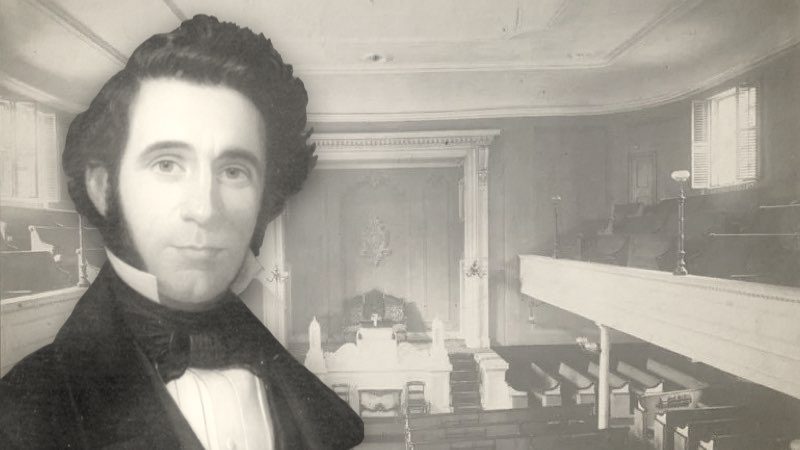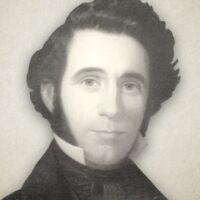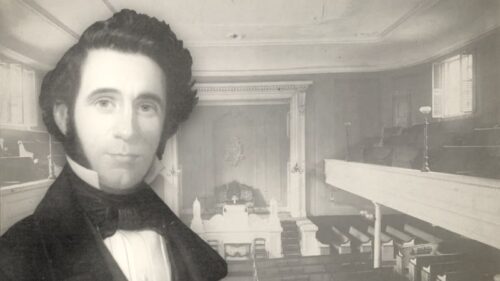
1 Propositions And Statements
I. Distinguishing Propositions
Proposition 1
The Bible is a Divine Revelation given of God to men, and is a complete and infallible guide and standard of authority in all matters of religion and morals; whatever it teaches is to be believed, and whatever it commands is to be obeyed; whatever it commends is to be accepted as both right and useful; whatever it condemns is to be avoided as both wrong and hurtful; but what it neither commands nor teaches is not to be imposed on the conscience as of religious obligation.
Proposition 2
The New Testament is the constitution of Christianity, the charter of the Christian Church, the only authoritative code of ecclesiastical law, and the warrant and justification of all Christian institutions. In it alone is life and immortality brought to light, the way of escape from wrath revealed, and all things necessary to salvation made plain; while its messages are a gospel of peace on earth and of hope to a lost world.
Proposition 3
Every man by nature possesses the right of private judgment in the interpretation of the Scriptures, and in all religious concerns; it is his privilege to read and explain the Bible for himself, without dictation from, or dependence on, any one, being responsible to God alone for his use of the sacred truth.
Proposition 4
Every man has the right to hold such religious opinions as he believes the Bible teaches, without harm or hindrance from any one on that account, so long as he does not intrude upon, or interfere with, the rights of others by so doing.
Proposition 5
All men have the right, not only to believe, but also to profess and openly declare, whatever religious opinions they may entertain, providing they be not contrary to common morality, and do no injustice to others.
Proposition 6
All men possess the common right to worship God according to the teachings of the Scriptures, as they understand them, without hindrance or molestation, so long as they do not injure or interfere with the rights of others by so doing.
Proposition 7
Civil governments, rulers and magistrates are to be respected, and in all temporal matters, not contrary to conscience and the word of God, to be obeyed; but they have no jurisdiction in spiritual concerns, and have no right of dictation to, of control over, or of interference with, matters of religion; but are bound to protect all good citizens in the peaceable enjoyment of their religious rights and privileges.
Proposition 8
No organic union of Church and State should be tolerated, but entire separation maintained: the Church should neither ask for, nor accept of, support from civil authority, since to do so would imply the right of civil dictation and control. The support of religion belongs to those who profess it.
Proposition 9
Christian men are to be good and law-abiding citizens, sustaining and defending the government under which they live, in all things not contrary to conscience and the word of God; while such government is bound to protect them in the full enjoyment of all their rights and privileges, both civil and religious.
Proposition 10
Religion is to be free and voluntary, both as to faith, worship and service; neither conformity to, nor support of, religion in any form, should be compulsory. Christian faith and practice are matters of conscience and personal choice, and not subject to official dictation; and for either civil or ecclesiastical authority to enforce conformity, punish dissent, or compel the support of any form of worship, is a crime against the rights of man, an assumption of divine prerogatives, and treason against Christ, the only Lord of the conscience and sovereign of the soul.
Proposition 11
None but regenerated persons ought to be, or properly can be, members of a Christian Church, which is a spiritual body separate from the world and distinct from the state, and to be composed of spiritual members only.
Proposition 12
Pastors are not to be imposed on churches nor taken from them without their consent; but are to be chosen by them, each for itself, at its own option, as by free men in Christ, who have a right to the choice and election of their religious teachers.
Proposition 13
Christ is the only Head over, and Lawgiver to, His churches. Consequently the churches cannot make laws, but only execute those which He has given. Nor can any man, or body of men legislate for the churches. The New Testament alone is their statute book, by which, without change, the body of Christ is to govern itself.
II. Distinctive Characteristics
In what respects do Baptists differ from other Christian denominations?
This is a question sometimes asked, and one which even Baptists themselves not unfrequently find it difficult to answer. If others misunderstand or misinterpret them, they should understand their own position, and be able to give a reason for it; they of all men, should be well instructed in the “kingdom of heaven,” especially so far as relates to their peculiar faith and order. Every honest mind searching for truth will ask, “What does the Bible teach?” rather than, “What do men believe?” Yet the former is often better learned by well understanding the latter. The opinions of men and the creeds of the churches are important to be known, for information if not for authority.
The following points indicate the more important respects in which Baptists differ from others, as to religious opinion and practice:
1. As to a Christian Church.
They hold that a Church is a company of disciples, baptized on a profession of their faith in Christ, united in covenant to maintain the ordinances of the Gospel, and the public worship of God; to live godly lives, and to spread abroad the knowledge of Christ as the Saviour of men.
Consequently an ecclesiastical system consisting of many organic units, a confederation of religious societies under one general government or head, is not a Christian Church, though sometimes bearing that designation.
2. As to Baptism.
They believe that baptism is the immersion, dipping, or burying a candidate in water, on a profession of his faith in Christ, and that such is the only form of baptism taught in the New Testament, or practised by the Apostles and first Christians. Consequently the form is essential to the ordinance, and nothing but immersion can be scriptural baptism.
Therefore sprinkling, pouring, and whatever other use of water may be resorted to, are not baptism at all, but substitutes for it. On the contrary, Pedobaptists hold that sprinkling and pouring are equally valid baptism with immersion, and because more convenient, are to be preferred.
3. Proper Subjects for Baptism.
Baptists assert that the only proper subjects for baptism are regenerated persons; those who have exercised and professed a saving faith in Christ, and are living orderly Christian lives.
On the contrary, some hold and teach that unregenerate persons may be baptized as a means of grace; while all Pedobaptists claim that unconscious infants, unregenerate and incapable of faith, should receive baptism on the faith of parents, or sponsors. All of which Baptists declare to be plainly contrary to the word of God and the economy of grace.
4. Proper Subjects for Communion.
As to who have the right and properly should come to the Communion of the Lord’s Supper, Baptists claim that only regenerate persons, baptized on a profession of their faith, and living in a godly and Christian manner as members of a church, have a right to, or can properly partake of, the Supper. Of course, then, baptism is prerequisite to the Supper; of course, also, the Church is to judge the qualifications of those who enjoy its privileges.
On the contrary, some believe and teach that baptism is not prerequisite to the Communion, therefore unbaptized persons may rightfully come to the Lord’s table; some also teach that conversion is not prerequisite to baptism and church membership, while others assert that each one should judge of his own fitness, and the Church cannot properly deny the privilege to any one who desires it.
All Pedobaptists invite to the Supper persons only sprinkled, whom Baptists regard as unbaptized; the Roman Church gives to the laity the Communion in one kind only, withholding from them the cup, and the Greek Church gives the Eucharist, as they do baptism, to unconscious infants. All of which Baptists consider contrary to the Scriptures, and subversive of Gospel order in the churches.
5. Subjects for Church Membership.
What class of persons should be admitted as members to the fellowship of Christian churches? Baptists say that godly persons, baptized on a profession of faith, are the only proper and suitable persons. That all others should be denied admission, and if already within the Church should be cast out.
Consequently, to receive unconverted persons, whether infants or adults, destroys the spiritual character of the body, and forms an unholy alliance with the world, instead of maintaining a broad and distinctive separation between them.
6. The Form of Church Government.
Is there any form of government for the churches taught in the New Testament? And if so, what is it? Baptists assert that each particular local Church is self-governing, and independent of all other churches, and of all persons and bodies of men whatever, as to the administration of its own affairs; that it is of right, and should be, free from any other human authority, whether civil or ecclesiastical, and that this is the New Testament idea of church government.
Others, however, with great diversity of opinion, hold and teach that local congregations of Christians should not govern themselves, but be governed by popes, bishops or priests, assemblies, conferences, conventions, councils, consociations, synods or presbyteries. All of which Baptists consider as contradictory of the New Testament and the practice of the primitive churches.
7. As to Church Officers.
What and how many are the Scriptural officers of a Christian Church? Baptists hold that they are two; pastors and deacons: besides these, there are no others. They assert that bishop and elder in the primitive churches were identical in office and authority, being pastors when holding the superintendence of churches, and evangelists when preaching from place to place; and that ruling and teaching elders were not, and properly should not be, distinct and separate offices in the churches. Consequently bishops are not a superior order of the clergy, nor ruling elders an order distinct from teaching elders.
On the contrary, other denominations claim more than two orders in the ministry and officers in the churches, running through a long list from pope to pastor, from cardinal to curate, from dean to deacon.
8. As to Doctrinal Belief.
In doctrine, Baptists agree very nearly with other evangelical Christians. They are what is usually called Calvinistic, as opposed to Arminian views of free-will and the sovereignty of grace. They hold the unity of the Godhead, and the equal Divinity of the Father, Son and Spirit: a full and free salvation proclaimed to all in Christ; the atonement and redemption by the meritorious sacrifice of Christ; justification by faith, not by works; the absolute necessity of regeneration in order to salvation the Holy Spirit the author and finisher of saving faith and sanctification; the personal election of believers; the perseverance of the saints by upholding grace; the resurrection of the body, and the life everlasting; also the endless duration of rewards and punishments, to be assigned by Christ, the judge of quick and dead, at His coming and glory.
There may be others, but the above named constitute those which chiefly mark the difference between Baptists and other Christians. These are the questions in respect to which misapprehensions most frequently arise, and on which information is most likely to be sought. And on all of them, while Baptists do not claim to be faultless, nor beyond the possibility of mistake and error, they appeal to the Bible, to history, to philology, in justification of their views, and in support of their position.
Edward Hiscox (1814-1901) was an American Baptist pastor and theologian. He was converted to Christ in 1834 and began to preach the gospel four years later. He served as the pastor for several congregations, including the Stanton Street Baptist Church, New York (1852). He is best known for authoring the “Standard Manual for Baptist Churches” (1890) and the “New Directory for Baptist Churches” (1894).




